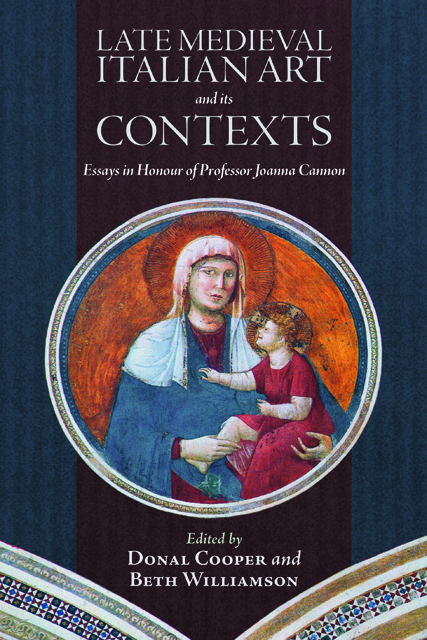Book contents
- Frontmatter
- Contents
- List of Illustrations
- List of Contributors
- Acknowledgements
- List of Abbreviations
- 1 Introduction: Circling Giotto
- 2 Holy Wood / ‘sacra tavola’: Saint Dominic and the Memory of Miracles in Bologna
- 3 The Sculpted Saint: A Statue of Saint Francis in Siena
- 4 Guccio di Mannaia and the Concept of a ‘Franciscan’ Chalice
- 5 ‘Speculum sine macula’: The Trittico di Santa Chiara in Trieste as an Object of Clarissan Devotion
- 6 The Siena Connection: A Franciscan Provincial Minister between Tuscany and Assisi at the Dawn of the Trecento
- 7 Simone Martini’s ‘Treaty with the House of Santa Fiora’ in Siena’s Palazzo Pubblico: Its Date and Significance
- 8 Crisis and Charity in Fourteenth-Century Florence: Ambrogio Lorenzetti’s Saint Nicholas Panels for San Procolo
- 9 Father of Light: Giotto and the Beatific Vision in the Baroncelli Chapel
- 10 Painter-Illuminator Workshops and the Church of San Giorgio a Ruballa: The Case of Bernardo Daddi and Pacino di Bonaguida
- 11 Patterns of Holiness: A Virgin Lactans in a Franciscan Context
- 12 A New Angle on Simone Martini’s Holy Family
- 13 Artistic Appropriation, Institutional Identity, and Civic Religion in Fourteenth-Century Siena: The Byzantine Treasury of the Hospital of Santa Maria della Scala
- 14 Visual Religious Education in Late Medieval Florence: Zanobi Perini, The Leggenda di Santo Tobia, and The Misericordia
- 15 Saints and Status in Late Medieval and Early Renaissance Florence
- Select Bibliography
- Publications by Joanna Cannon
- Index
- Tabula Gratulatoria
- Backmatter
1 - Introduction: Circling Giotto
Published online by Cambridge University Press: 20 December 2022
- Frontmatter
- Contents
- List of Illustrations
- List of Contributors
- Acknowledgements
- List of Abbreviations
- 1 Introduction: Circling Giotto
- 2 Holy Wood / ‘sacra tavola’: Saint Dominic and the Memory of Miracles in Bologna
- 3 The Sculpted Saint: A Statue of Saint Francis in Siena
- 4 Guccio di Mannaia and the Concept of a ‘Franciscan’ Chalice
- 5 ‘Speculum sine macula’: The Trittico di Santa Chiara in Trieste as an Object of Clarissan Devotion
- 6 The Siena Connection: A Franciscan Provincial Minister between Tuscany and Assisi at the Dawn of the Trecento
- 7 Simone Martini’s ‘Treaty with the House of Santa Fiora’ in Siena’s Palazzo Pubblico: Its Date and Significance
- 8 Crisis and Charity in Fourteenth-Century Florence: Ambrogio Lorenzetti’s Saint Nicholas Panels for San Procolo
- 9 Father of Light: Giotto and the Beatific Vision in the Baroncelli Chapel
- 10 Painter-Illuminator Workshops and the Church of San Giorgio a Ruballa: The Case of Bernardo Daddi and Pacino di Bonaguida
- 11 Patterns of Holiness: A Virgin Lactans in a Franciscan Context
- 12 A New Angle on Simone Martini’s Holy Family
- 13 Artistic Appropriation, Institutional Identity, and Civic Religion in Fourteenth-Century Siena: The Byzantine Treasury of the Hospital of Santa Maria della Scala
- 14 Visual Religious Education in Late Medieval Florence: Zanobi Perini, The Leggenda di Santo Tobia, and The Misericordia
- 15 Saints and Status in Late Medieval and Early Renaissance Florence
- Select Bibliography
- Publications by Joanna Cannon
- Index
- Tabula Gratulatoria
- Backmatter
Summary
Joanna Cannon’s impact on the study of late medieval Italian art has been profound. Her influence is felt as a scholar through the seminal publications in her bibliography and as a teacher who has trained numerous researchers active in the field, both as university academics and museum curators, across Europe and North America. This book is offered by her doctoral students as a celebration of Joanna’s remarkable career and achievements, and in gratitude for her dedication and generosity to her field, her students, her colleagues, and her friends.
Joanna’s scholarship is driven by a historically contextualised approach that, to a great extent, can be seen continued within the work of her students. This is coupled with a determined focus on the visual and material qualities of the objects under her examination. A close attention to the object – whatever that object might be: altarpiece, wall painting, votive panel, portable diptych, manuscript, metalwork, or ivory (Fig. 1.1) – has always been a fundamental tenet of Joanna’s research and teaching. Her concern with materiality is amplified by a commitment to analysing the physical characteristics of works of art by means of technical analysis, and to understanding the creative processes and working practices of artists. A further interest concerns the multifarious and changing ways in which viewers experienced the art of late medieval Italy. This wide range of ways of looking indicates the comprehensive nature of Joanna’s research, and helps to explain why she has been such a keenly sought-out collaborator by colleagues within art history and also in adjacent fields.
Joanna’s interests and approach were shaped by the fertile academic environment of The Courtauld Institute of Art and the wider University of London in the 1970s, where the study of medieval art and architecture flourished under the interdisciplinary aegis of Peter Kidson (the legendary ‘PK’ to Joanna and her contemporaries). Having already spent three years at the Institute as an undergraduate, she took her PhD on ‘Dominican Patronage of the Arts in Central Italy: The Provincia Romana c. 1220–c. 1320’ with Julian Gardner, who continued to supervise Joanna after departing The Courtauld to establish the History of Art department at the University of Warwick in 1974.
- Type
- Chapter
- Information
- Late Medieval Italian Art and its ContextsEssays in Honour of Professor Joanna Cannon, pp. 1 - 10Publisher: Boydell & BrewerPrint publication year: 2022



